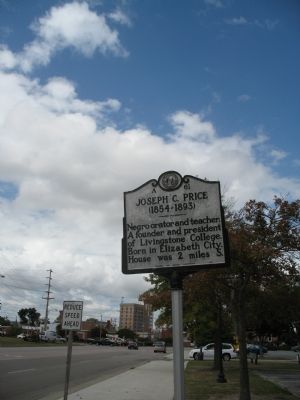Elizabeth City in Pasquotank County, North Carolina — The American South (South Atlantic)
Joseph C. Price
(1854–1893)
Erected by Archives and Highway Departments. (Marker Number A-61.)
Topics and series. This historical marker is listed in these topic lists: African Americans • Education. In addition, it is included in the African Methodist Episcopal Zion (AME Zion) Church, the Historically Black Colleges and Universities, and the North Carolina Division of Archives and History series lists.
Location. 36° 17.776′ N, 76° 13.099′ W. Marker is in Elizabeth City, North Carolina, in Pasquotank County. Marker is at the intersection of Sourthern Avenue and Riverside Avenue, on the right when traveling north on Sourthern Avenue. Touch for map. Marker is in this post office area: Elizabeth City NC 27909, United States of America. Touch for directions.
Other nearby markers. At least 8 other markers are within walking distance of this marker. J. C. B. Ehringhaus (here, next to this marker); A Town Divided (about 300 feet away, measured in a direct line); Pasquotank River (about 300 feet away); Battle of Elizabeth City (about 400 feet away); Wright Brothers in the Albemarle (about 400 feet away); Culpeper’s Rebellion (about 700 feet away); Soybean Processing (about 800 feet away); a different marker also named Wright Brothers in the Albemarle (approx. 0.2 miles away). Touch for a list and map of all markers in Elizabeth City.
Regarding Joseph C. Price. Joseph C. Price was born in Elizabeth City, the child of a free mother and a slave father. When his natural father was sold and sent away, his mother, Emily Pailin, married David Price. In 1863 the Prices moved to New Bern where Joseph was enrolled in St. Andrew’s School, opened there by James Walter Hood, later the bishop of the A.M.E. Zion Church. Young Price, though late in beginning his formal education, made exceptional progress. After St. Andrew’s, he attended Cyprian Episcopal School and Lowell Normal School, where he gained the skills needed to become an educator. After completing his own education, he taught in Wilson, becoming the principal at a school there in 1871. In 1873, Price enrolled at Shaw University to study law, but shortly thereafter transferred to Lincoln University (Oxford, Pennsylvania) to prepare for the ministry in the A.M.E. Zion Church. He was valedictorian of his class at Lincoln in 1879 and stayed on at the school to complete the three-year seminary course in only two years.
In 1881 Price distinguished himself as an orator, speaking on prohibition and later on education and race issues. On a speaking tour in Europe, Price raised nearly $10,000 to establish a college for blacks in North Carolina. With the additional support of Salisbury residents, he became president of Zion Wesley College in 1882. The name was changed to Livingstone College in 1885. Price gained national attention during his tenure at the college. He was offered a variety of prestigious positions, but chose to remain at Livingstone. In 1890 Price was elected president of the Afro-American League and the National Equal Rights Association.
Price’s promising life ended abruptly October 25, 1893, after he contracted Bright’s disease, a disease affecting the kidneys. He was buried in a mausoleum on the campus of Livingstone College. He was survived by his wife, the former Jennie Smallwood, and their five children, one of whom was yet unborn at the time of her father’s death.
References:
• Paul Yandle, “Joseph Charles Price and His ‘Peculiar Work,’” North Carolina Historical Review (January and April 1993): 40-56, 130-152
• Walter L. Yates, He Spoke, Now They Speak: A Collection of Speeches and Writings of and on the Life and Works of J.C. Price (1952)
• William S. Powell, ed., Dictionary of North Carolina Biography, V, 143-144—sketch by John Inscoe
• Ethel Stephens Arnett, For Whom Our Public Schools Were Named, Greensboro, North Carolina (1973)
• Lenwood G. Davis, A Travel Guide to Black Historical Sites and Landmarks in North Carolina (1991)
Copied from the North Carolina Department of Cultural Resources
Credits. This page was last revised on November 29, 2019. It was originally submitted on October 1, 2007, by Laura Troy of Burke, Virginia. This page has been viewed 1,760 times since then and 54 times this year. Last updated on February 18, 2008, by Christopher Busta-Peck of Shaker Heights, Ohio. Photo 1. submitted on October 1, 2007, by Laura Troy of Burke, Virginia. • Craig Swain was the editor who published this page.
